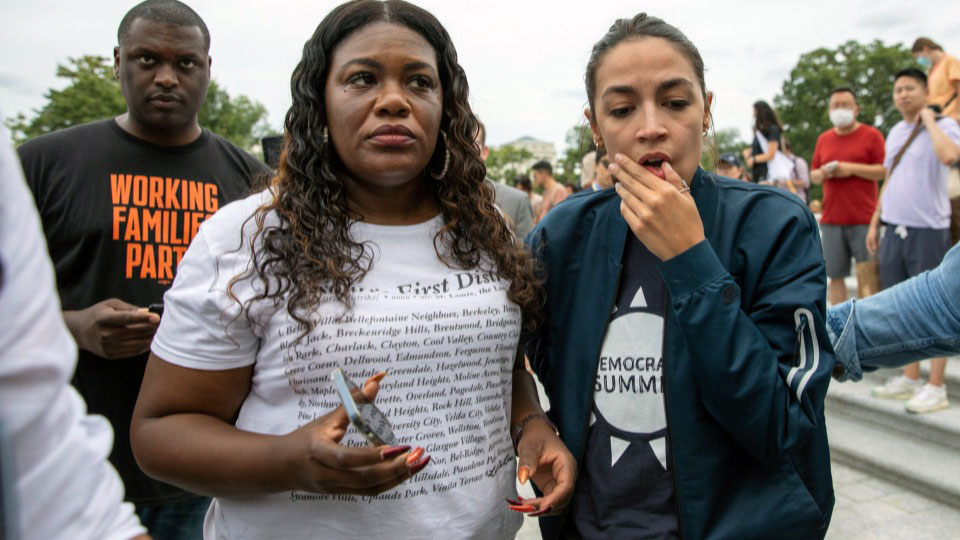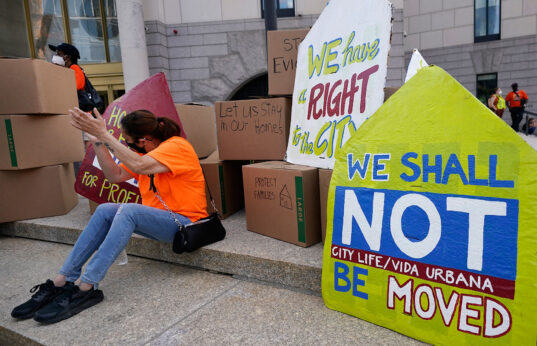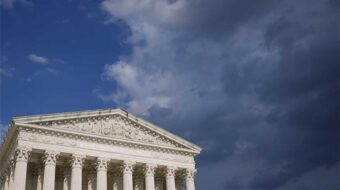
The 3.5 million people currently being kept in their homes thanks to the federal government’s pandemic eviction moratorium may soon be out on the streets thanks to the conservative majority on the U.S. Supreme Court.
The right-wing justices’ ruling, issued late Thursday, blocks the Biden administration from enforcing the temporary moratorium extension imposed in early August and due to last until Oct. 3. In an unsigned opinion, the Court declared the Centers for Disease Control had gone beyond its mandate in deciding landlords cannot evict tenants over unpaid rent.
Justice Stephen Breyer and the other two Democratic-nominated members of the Court dissented, arguing that “public interest strongly favors respecting the CDC’s judgment at this moment.” They pointed to the fact that over 90% of counties across the U.S. are again experiencing high COVID-19 transmission rates and that a wave of mass evictions will only worsen the pandemic’s resurgence.
The ban on throwing people out of their homes was first put in place in the early days of the coronavirus crisis as millions lost their jobs and incomes. Fearing that the newly homeless would crowd into relatives’ homes or shelters and contribute to virus spread, the CDC blocked evictions nationwide.
The case the Supreme Court ruled on Thursday was initiated by landlords in Alabama and Georgia. After losing in the U.S. Court of Appeals in D.C., the plaintiffs made an emergency appeal to the Supreme Court—where they got the ruling they sought.
“If a federally imposed eviction moratorium is to continue, Congress must specifically authorize it,” the Supreme Court decided. The conservatives on the Court said only the legislative branch has the power to make eviction policy, not public health authorities.
Rep. Cori Bush, the new Democratic congresswoman from Missouri who has become the face of the national anti-eviction movement, immediately took up the Supreme Court’s challenge.
“We are in an unprecedented and ongoing crisis that demands compassionate solutions that center the needs of the people and communities most in need of our help,” she declared immediately after the ruling. “We need to give our communities time to heal from this devastating pandemic.”
Bush camped outside the Capitol with tenants’ rights activists and renters facing eviction in late July to urge the Biden administration to extend the moratorium. The ban expired on July 31, but thanks largely to the work of Bush and activists, as well as pressure from House Speaker Nancy Pelosi, the CDC renewed a limited version of it for counties hardest hit by coronavirus.

“We didn’t sleep on those steps just to give up now,” Bush said Thursday. “Congress must act immediately to prevent mass evictions.” She vowed to lead a fight in Washington to overcome the right-wing Supreme Court ruling.
Bush, the first Black Lives Matter activist elected to Congress, has spoken openly about her own experience of homelessness in her hometown of St. Louis. She went through periods of living in her car with her two young children in the past and has made the nation’s housing crisis a key theme of her time in the House of Representatives so far.
“We have a deeply rooted misconception in our country that unhoused people have done something to deserve their conditions—when the reality is that unhoused people are living the consequences of our government’s failure to secure the basic necessities people need to survive,” Bush wrote in an essay that grabbed national attention earlier this summer.
The White House said it was “disappointed” in the ruling and pleaded with “cities, states, local courts, landlords, and Cabinet Agencies” to use whatever power they have to prevent evictions. The administration did not signal any further action it plans to take in light of the Supreme Court’s decision.
In addition to preventing immediate mass homelessness, extending the moratorium would also buy time to distribute more of the $46.5 billion of rental assistance funds that Congress already approved. According to the Treasury Department, almost a million households have received some rent relief, but the pace of distribution has been excruciatingly slow.
Just over a tenth of the money—a little over $5 billion—has gone out the door to date. The Biden administration points fingers at state and local governments who, it says, have dragged their feet in getting help to tenants in need. Housing advocates also say the program was hindered by the Trump administration, which failed to issue clear eligibility and application guidelines, a problem they say has only slightly improved under Biden.
Speeding up distribution of the emergency rent funds would provide relief for not only tenants, advocates argue, but also the small “mom-and-pop” landlords who rely on rent from single properties as part of their income. Further, by keeping people housed, it would act as a dam against a flood of more coronavirus infections.
As for next steps on the eviction fight, Congress now becomes the main arena of struggle. Pressure will be placed on state and local authorities and individual landlords, but the Supreme Court’s decision means only Congress can effect a nationwide response to the looming homelessness catastrophe.
Rep. Maxine Waters, D-Calif., has introduced the Protecting Renters from Evictions Act, but due to Republican objections, the bill has yet to make it out of committee. The overturning of the eviction moratorium, activists hope, will spark new support for the proposal.
“We were outside the Capitol for five days. Rain. Heat. Cold,” Rep. Cori Bush told followers Thursday night. “If they think this partisan ruling is going to stop us from fighting to keep people housed, they’re wrong.”












Comments